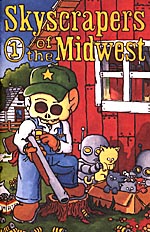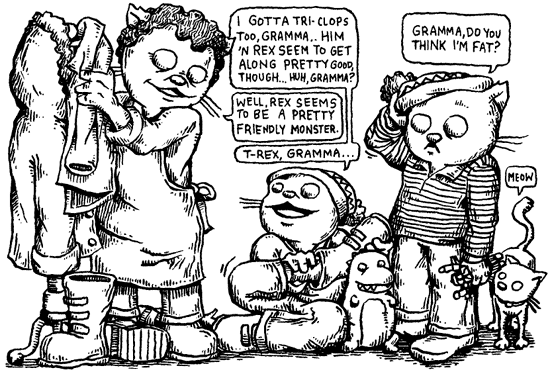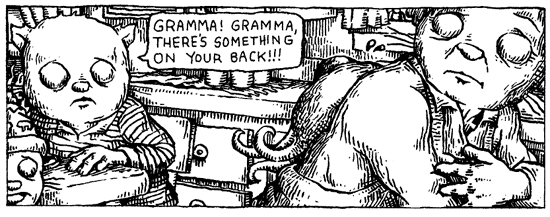 By Joshua Cotter
By Joshua Cotter
56 pages, black and white
Published by AdHouse Books
For better or for worse, a familiar theme in comics seems to be about the trials and tribulations of childhood. Most of the time you see the subject matter coming a mile away, resulting in good but still fairly predictable stories. Maybe it was the imaginative title of Skyscrapers of the Midwest, or perhaps the cute anthropomorphic cats that make up its cast, but I have to say that in many ways this is one of the few books that genuinely surprised me in quite a while.
As a pair of brothers grow up in rural America, the two have to fend off a number of enemies. It’s not the big things like evil robot warriors or monsters from outer space that they have to worry about, because they’re sure they could take care of those. No, it’s the menaces of fellow students, self-deprecation, and the unknown that are the real killers here.

When I first read Skyscrapers of the Midwest it reminded me of another book, but it took me a while to figure out the connection. The book in question was Debbie Dreschler’s Daddy’s Girl, and while the two are very dissimilar in subject matter, they had one thing in common: reading them opens you as a reader up to the possibility of soul-crushing despair. A lot of the basic ideas are ones you’ve read before, like being ostracized on the playground as a child, or a gift that is both great and bad at the same time. What hits home with this first issue of Skyscrapers of the Midwest is how well the stories are crafted. There’s a real sense of raw emotion on display here, able to evoke feelings with the greatest of ease. You can actually sense the impending disaster when the boys visit their grandmother, for instance, even though it’s hard to put your finger on exactly what has gone wrong or what the clues are. Even when things seem to be going right, there’s always that air of disaster in the background. In stories where there’s a genuine punchline waiting to be unleashed at the end instead of something bad, it’s such a relief that you can’t help but actually give off a sigh as the breath you’ve been holding is finally released. This is really powerful stuff that Joshua Cotter is ready to almost casually unleash on his readers.

The art in Skyscrapers of the Midwest is integral to the emotions that are broadcast through its pages. The characters drawn as cats could have easily backfired, but Cotter’s art style makes it all the better. The way he creates the characters on the page allows so many feelings to shine through on their faces and through their body language; when the older brother isn’t picked to play with the other boys, you can see his shoulders tense up and his torso pull together in surprise and vulnerability, then drop in disappointment as he’s abandoned by his classmates. Sometimes the art is a combination of subtle and shocking, like in the trip to the grandmother’s where at first everything just seems wrong even in the face of normality, only to have the bizarre and terrifying suddenly appear without any warning. The way that Cotter draws the grandmother’s affliction is clever, letting it look horribly wrong by our standards, yet able to stand for so many different possible things in the reader’s mind. It’s a carefully crafted end result, and one that works really well.
Everything in Skyscrapers of the Midwest works perfectly for me, even down to the fake advertisements and letters pages which seem normal at first but are in fact horribly off-kilter. It’s easy to see why the original mini-comic editions of Skyscrapers of the Midwest generated so much buzz; this is a comic that manages to be incredibly compelling even as it disturbs and unsettles. The comic evokes strong enough feelings in me that I can’t say I’m eager to read a second issue right away—there’s only so much of a downer one wants to experience in such a short time span—but I know that when it is published, I’ll be more than ready to jump on board. Cotter’s creations may be depressing, but you just can’t stop reading it. Now that’s talent.
